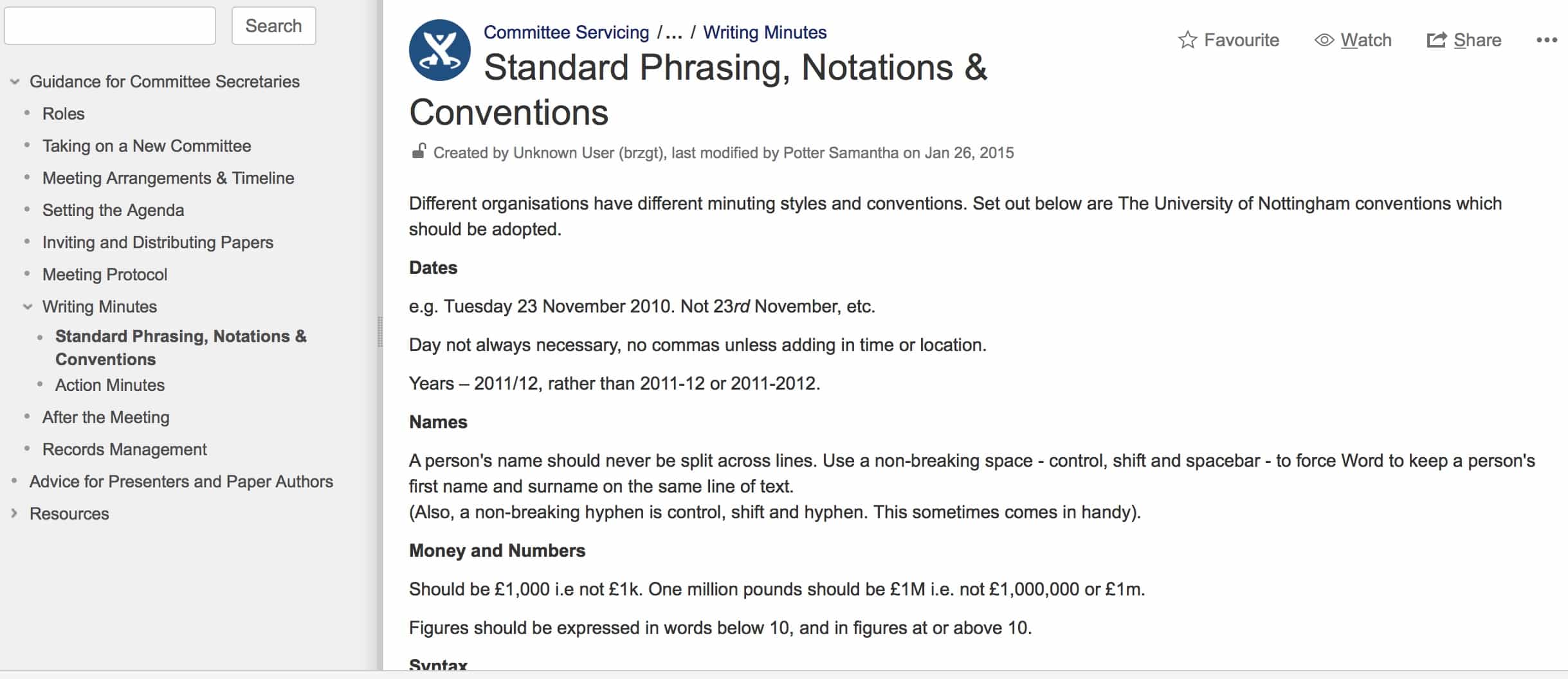In a recent post I reflected on some of the changes in university management and administration (and blogging) over the past decade or so.
Despite all of the changes which have taken place in higher education in recent years, all the structural re-organisations, lean programmes and exciting new approaches to effectiveness and efficiency, universities are still full of committees.
Not all of them might be regarded as hugely important but I would argue that ensuring proper committee operations at all levels is actually a critical part of university management and governance. It requires a level of discipline and consistency which is part of the enduring infrastructure of a university and underpins the professional ethos of a university administration. Get these formalities right and many other things follow.
So there are some really good reasons why we need good committee practice and effective minuting of meetings. As I have written here before university governance and getting governance right really matters. A small but important part of ensuring effective governance is making the system work effectively and proper committee operations is central to this. Planning the programme of work, agenda-setting, ensuring proper information provision and recording decisions accurately are all essential to helping this system function properly.
Throughout my administrative career I have been required to undertake committee work and whilst at times it has felt tedious and rather pointless being able to do this properly has been consistently beneficial. Being ‘invited’ to take on the secretaryship of a committee was not an opportunity to be declined. I’ve therefore always thought that committee work was fundamental to an administrator’s role and was particularly keen to ensure that at the University of Nottingham we had a proper Committee Handbook covering, among other things:
- Committee roles
- Taking on a new committee
- Meeting arrangements & timeline
- Setting the agenda
- Inviting and distributing papers
- Meeting protocol
- Writing minutes
- After the meeting
- Records management
- Advice for presenters and paper authors
- Templates for agenda, papers and minutes
A number of colleagues contributed to this to ensure we had really clear and established guidelines on all aspects of committee operations. However, I have to admit it has not been terrifically well-used over the years.

An extract from the Committee Handbook
My long-held view, that every ambitious administrator should be keen to take on a committee in order to expand their horizons and improve their skills, is clearly out of date. Things have changed and not only is there a real reluctance from individuals to take on the committee secretary role, but the art of agenda setting and minute writing and broader committee skills are seemingly not valued these days.
Why has it come to this then? It’s hard to say really but fashion I think has a lot to do with it. There is also something very non-digital, un-zeigeisty and just a bit boring about doing all of this stuff properly. I suspect that a lot of administrators now feel it is possibly beneath them to write minutes and all that tedious committee-gubbins is for more junior staff. It is also possible that the title inflation phenomenon in university administration has contributed to this.
I also have a suspicion that there are so many crappy Microsoft Word templates for action points and meeting notes out there that everyone thinks this is all really straightforward and you can just bang it in. And while I’m on it I fear that next to no-one feels comfortable with the subjunctive these days thanks to the failings in our school system. Grim times indeed.
What is to be done? I’m afraid I don’t know. Many universities do have the equivalent of our Committee Handbook and AUA once upon a time published a Good Practice Guide (excellently titled Just a Minute and written by Jean Grier who also regularly ran AUA conference sessions on the topic for forward-thinking administrators). And there are still, thankfully, some colleagues who do take this seriously and appear to be able to write very good minutes extremely quickly and with very little need for amendment.
Nevertheless I don’t hold out much hope for some resurgence in the demand for proper minute-writing as a result of new legislation (a hitherto unnoticed clause in the Higher Education and Research Act perhaps) or some regulatory infraction which requires a tight committee system as a response. So there is not much chance really of a big change here.
I hope this isn’t golden age longing or a kind of committee-based nostalgia (which would be bizarre). It may feel dull but proper committee processes are important to effective university operations and governance. Moreover, a good track record in committee work also provides sound evidence of comprehension, analysis and writing skills which I hope would still be regarded as essential for career progression.
Minute-writing does though appear to be a dying art. I fear universities will be less effective places for it in the long run.














Paul, I’m with you 100%; good minute writing is as much a feature of the accomplished academic administrator as it is a feature of the accomplished academic. The measured judgement and careful nuances of a good set of minutes is alien to the immediacy of everything now, reinforced by social media. It’s hard to write a good set of minutes in 140 characters (but maybe you could try that for the next Senate meeting).
Excellent point Rob!
Thanks for writing this Paul. This is an issue we have been discussing a great deal lately as part of a joint King’s/City University project on defining the special characteristics of academic administration.
Thank you Tessa – that sounds like a great project.
I was trying to remember the other day when I last received a proper inter-office memorandum, with a subject line and so on. It’s not just fashion I suspect: there was an era before these things and we are living in an era after them. Will they come back? Like Paul, I doubt it.
Very good point
I agree entirely with the points mentioned in your article. Being a committee secretary provides an administrator with an excellent opportunity to engage in University business at all levels. Preparing paperwork and writing minutes is a way to be informed yourself and also steer the informing of others.
And yes, some administrators may feel it’s beneath them or that it is a tedious task. But done correctly it can be rewarding and informative.
Wholly agree Sally
Even in training there’s a degrading of this role. As I’m starting out freelancing as (among other things) a board secretary I looked at what others offer. I was dismayed to find a training course at a large Russell Group declaring things like “The Secretary is principally a note-taker” and “They shouldn’t be active in the meeting or give advice”.
I’ve real pride in knowing that my minute work is in the archives of several universities and charities – though possibly that does make me quite sad…
Agreed – I really get cross at the idea of the passive, silent “note-taker”
My first proper job in HE was in a QA team writing minutes for L&T committees. Whilst I can’t say it was the most exciting thing I have ever done the skills I learnt doing it (reading between the lines, drafting quickly and accurately, concentration) still serve me well. It would be a shame if it was dying out.
Thank you Chris. I do fear it is dying though.
A large part of the quality in both minute-taking and management of the meeting is the Chair.
Having to adapt to the “style” of the Chair (and for some Chairs, adapting to their feelings at that particular meeting) can be a challenge which in some cases disempowers and devalues the Secretarial role.
A lack of consistency in the Chairing can be a major factor in poor consistency of minutes, and the conduct of the meeting.
Very good point there Matt.
Agree Paul. For me taking on a committee provided development not only in how to write clearly and succinctly (rather than verbatim) but also in how the institution operated. Latterly it has been what happens outside of meetings, the relationship management, that has provided even greater learning. Committee servicing is so much more than circulating papers and writing minutes so I strongly encourage others to take up the opportunity if it comes along – as long as they can write a good set of minutes that is!
All very good points Dawn – thank you.
There’s a guide to minute-taking for the Cabinet available online; that’s an interesting read.
I agree with all the points you raise. I also think how information/decisions are communicated after meetings is key to effective committees and governance.
Very good point – follow up is often a weakness (forgotten until the next meeting…)
As someone who started out as a professional committee clerk in local government, I completely agree with this. What can the sector do to improve standards in this area?
I totally agree with what Matt E says above, which is something often overlooked! I have been working in admin in some form or other for donkeys years but I can honestly say I have only ever worked with one Chair who knew exactly how to run a formal meeting and keep it tightly controlled and on topic if people were inclined to ramble off on a tangent and she always succinctly summarised the main point and any Actions for the minute taker. She made it so much easier when taking notes / minutes within multi-disciplinary meetings. I certainly have… Read more »
100% agree with this.
couldn’t agree more – I’m agnostic about how effective a mechanism committees are for making decisions, but almost evangelical about how extraordinarily effective a mechanism they can be for keeping records. But only if/when properly managed.
I actually really enjoy minute writing. Minutes help tell a story not just about a meeting but also the environment in which it has taken place, capturing something of the institution which otherwise might not be seen. At a previous institution, minutes for some of the main school committees were put in the archive alongside a sample of student work, research outputs etc as they were considered an important part of the institutional record; this was not for record retention purposes but documenting a particular moment in time. I agree that minute writing alongside all other aspects of committee servicing… Read more »
It always strikes me that minute-taking (if taken seriously) is the most intellectually taxing job in any committee meeting. Yet it’s often left to the least valued (least well paid) person in the room. While high-paid senior management pontificate endlessly, others (like me) are left to make sense of it all.
The person taking the minutes is the only one who has to pay attention through the entire meeting. Even the Chair can get away with drifting off occasionally. That sometimes leaves the secretary as the person with the best overall grasp of committee business even though, as others have pointed out, they are often regarded as the least important person in the room. Good minute taking is one of those invisible arts. When you are doing it properly nobody notices. It’s only if you happen to make a typo on page 8 that they pay any attention!
I agree with most of the points above. Personally I hated taking minutes but saw the value in the production of an accurate, concise finished product. My favourite minute (written by my now wife, actually) is, “Members embarked on a lengthy, acrimonious but ultimately inconclusive debate”. The minutes were signed off unaltered by the Chair and approved at the next meeting.
Having worked in University administration for over 30 years, including a stint as head of committee services, I thoroughly agree. In my current role, I am also involved in handling student complaints and appeals including cases which go as far as the OIA. All too often I find weaknesses or slopiness in the drafting of minutes which mean that the student has to be given the benefit of the doubt because we simply can’t document that decisions were taken properly, due consideration given etc. I’ve also always said that one of the duties of a good committee Secretary is to… Read more »
All very good points indeed Sheila. Thank you.
An even bigger challenge is where you a minuting the meeting and presenting some of your own papers at the same time. I’ve managed to do this several times, and it does pose a different set of challenges.
In my career so far I’ve found servicing committees invaluable in gaining knowledge about how universities work (Faculty board, weekly, is my example). As you develop in your role you do tend wield some influence in decision making – the oracle of what happened before, setting out actions and deadlines and making sure they happen (which is more than just sending out reminders). Now in a project based role knowing how to capture concisely the key moments (agreements, actions) is an invaluable skill one I see many other struggle with and in turn struggle to deliver their projects.
Very good article Paul, thank you.
Like Sheila’s point above, I think that a key part of the committee clerk’s ‘toolkit’ is the deep breath before saying ‘excuse me chair, can you clarify….’
If clear outcomes are not recorded then why have the meeting at all (or maybe that’s a question for a whole different discussion!)
Thanks for mentioning Jean Grier’s guides, I have carried my copies between various desk-moves, and still use them to help induct colleagues who are new to supporting committees – as well as providing reminders to more ‘experienced’ colleagues.
That is a fantastic minute summary…
If only the Jean Grier guide were available online…